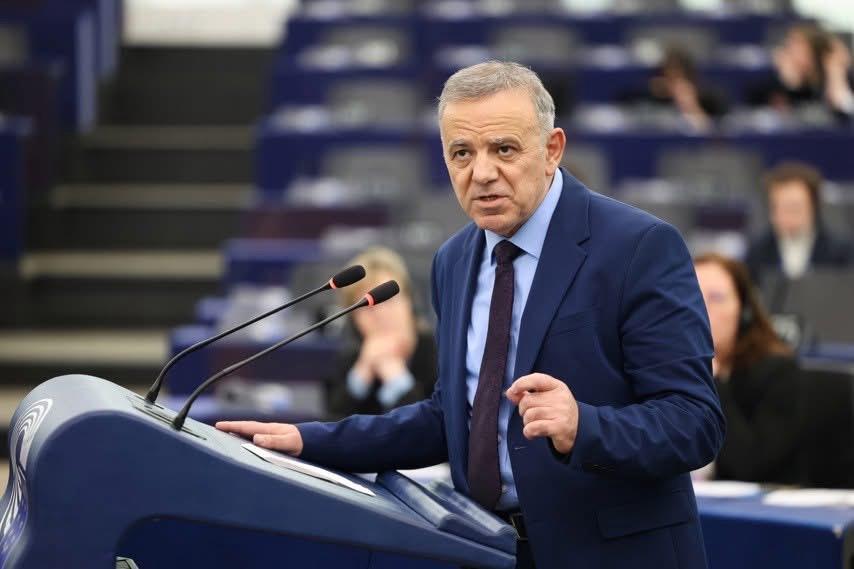Cypriot members of the European Parliament on Tuesday called for Turkey to be excluded from the European Union’s plans to bolster its defence capabilities, with one MEP describing the country as “neo-Ottoman” and another calling for sanctions on it.
Four of the island’s six MEPs spoke at Tuesday’s session in Strasbourg against the backdrop of Turkey’s role in the European defence conversation becoming more central as the continent looks closer to home for arms as the United States steps back from its stance in Ukraine and potentially its commitments to Nato.
A white paper on European rearmament, potentially including under its umbrella “partner countries” including Turkey, is set to be put before the European Council on March 20.
Disy MEP Loucas Fourlas was the first to speak, first saying the white paper “must pave the way for the creation of a European force which will be able to defend its borders and interests”.
However, he stressed his vehement opposition to Turkish involvement.
“Turkey, a country which illegally occupied half of my homeland, cannot participate in this effort towards a European defence mechanism … Turkey has not even complied with the sanctions against Russia and has not recognised Hamas as a terrorist organisation,” he said.
Akel MEP Giorgos Georgiou was no less scathing of the idea, with his party having had harsh words for Ukrainian President Volodymyr Zelenskiy and the Cypriot government’s support for him over the weekend.
“You will impoverish the peoples of Europe and enrich the merchants of death … To have a common defence, their must be a common foreign policy, but there are many unwilling to do so,” he began.
He added, “you are holding rallies proclaiming Turkey as the guarantor of European security, supposedly to support Ukraine and its people”, before going on to speak of a “vulgar bargain” over plans to extract Ukrainian natural resources in exchange for its defence.
Elam MEP Geadis Geadi said the idea of a common European defence is “a move in the right direction”, but, like all his Cypriot colleagues, was in no mood to accept Turkish involvement, speaking of “audacity” on the country’s part to say Europe “cannot fail to include it” in its defence plans.
“Not only should Turkey not be allowed to do this, the EU must proceed with sanctions against it and a veto on its equipment,” he said.
Diko MEP Costas Mavrides said that while a unanimous decision was made to secure the EU’s borders, “these borders are already being violated by neo-Ottoman Turkey, which occupies part of the EU in Cyprus”.
He added that Turkey “occupies territories in Syria and Iraq and has a military presence in Libya and elsewhere”.
“Paradoxically, however, neo-Ottoman Turkey is not considered a threat, but an ally in European defence, as a member of Nato … This is the hypocrisy which divides us,” he said.
Earlier in the day, European Commission President Ursula von der Leyen had addressed the session, warning that the “era of illusions” is over.
“After the Cold War, some believed Russia could be integrated into the European economic and security architecture. Others hoped we could indefinitely rely on the United States. This complacency has weakened our vigilance,” she said.
She added, “we thought we could benefit from a peace dividend, but in reality, we created a security deficit”.
As the session was ongoing in Strasbourg, French President Emmanuel Macron was holding a meeting with military chiefs from 30 countries including Turkey with the aim of drawing up plans “to define credible security guarantees” for Ukraine in the event of a ceasefire.
Meanwhile, it is expected that Donald Tusk, former European Council president and current prime minister of Poland, the incumbent holder of the Council of the European Union’s rotating presidency, will visit Turkey on Wednesday, with security and defence top of the agenda.
“Everything indicates that Turkey is ready for this,” Tusk said on the country’s enhanced role in European defence.
Turkey’s bolstered role in European defence has extended to actions as well as words, with Italian weapons manufacturer Leonardo and its Turkish counterpart Baykar last week having announced a joint venture to produce unmanned aerial vehicles, while Turkey has been supplying arms to Ukraine since it was invaded by Russia in 2022.
At the European level, the debate over whether to allow contractors from the EU’s five “partner countries”, Turkey, the United Kingdom, Norway, Switzerland, and Canada, access to the boosted funding has seen French President Emmanuel Macron and German Chancellor Olaf Scholz at loggerheads.
Scholz has argued that contractors in non-EU allies must have access to the funds, while Macron has insisted that the funds be available only to domestic European manufacturers.
Given the spectre of Turkey arming itself with EU funds while the Cyprus problem remains unsolved, Cypriot President Nikos Christodoulides on Sunday and his Finance Minister Makis Keravnos on Monday have both taken Macron’s position.
Keravnos said the financial support “must focus on the European defence industry and not on the defence industries of third countries”.
His statements echoed those of Christodoulides a day prior, who had said, “EU money in relation to investment in this sector … must strengthen European defence cooperation.
“Because, as the EU, if we continue to depend on third countries in relation to our defence, our energy, our raw materials, we will never achieve our goal of strategic autonomy.”






Click here to change your cookie preferences